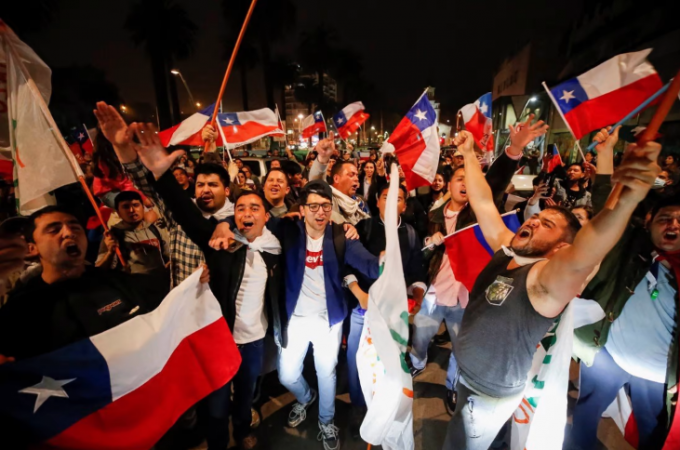
Chile: The people of Chile vehemently rejected a proposed new constitution to replace the one adopted during the dictatorship of Augusto Pinochet, but President Gabriel Boric vowed to push for political reform.
In a result that exceeded the expectations of the conservative opposition, the reject camp took the lead with nearly 62 percent of the vote, compared with just over 99 percent of the votes for those in favour, with a count of just over 38 percent. The count took place.
Admitting defeat, the leftist Borik, who had supported the new text, promised that "will do everything on my part to create a new constituent itinerary."
According to him, the public had shown that "they value and want democracy, and they are counting on it to resolve our differences and move forward."
"All political forces to put Chile ahead of any legitimate differences and to agree as soon as possible on the deadlines and guidelines for a new constitutional process," he again urged.
The result is a much larger margin of victory than the election projections, which suggested that the constitution be rejected by 10%.
"This defeat is also your defeat, President Boric," declared far-right leader Jose Antonio Cast, a vocal Pinochet supporter who lost to Boric in an election run-off last December.
Javier Macaya, leader of the conservative UDI party, announced that his party would fulfill its promise to work towards a new constitution, even as they celebrate "defeat for the return of Chile".
More than 15 million people had the opportunity to vote in the compulsory election on Sunday.
The social turmoil of 2019 sparked the idea of revising the Constitution, but the 388-article draft was divisive and often puzzling to voters.
The proposed constitution sought to legalize abortion, strengthen indigenous rights, and create a more welfare-based society.
Students who were initially angry with the proposed Metro fare hike staged protests in October 2019, which mainly took place in the country's capital.
These protests sparked a major rebellion against the country's neoliberal economic system and rising inequality.
Prominence given to the country's indigenous people, who make up close to 13% of the 19 million-strong population, was one of the main points of contention for opponents.
There has also been great interest in proposals to protect the environment, reproductive rights and natural resources such as water, which some claim are exploited by private mining companies.
A less powerful "chamber of regions" would have replaced the Senate, and the new constitution would require that women hold at least half of the positions in public institutions.
According to Alfredo Tolosa, a 47-year-old woodworker from Tucapel, a small town in the southern Biobio region, people are more accepting here.
"Because they fear change, they see it as the best course of action. They have food and a job, and they believe they will lose them.
Some were concerned that the new text would lead to unpredictability and instability, which would then damage the economy.
Sociologist Marta Lagos described it as a "great failure" for the sanctioned camp and a "tremendous victory for the disapproved".
"No one expected a difference of more than 20 percentage points," he tweeted.
The new constitution was supported by those who thought it would transform a conservative nation with social and ethnic tensions and lay the groundwork for a more egalitarian society.
They argue that the current constitution gives private enterprise free rein over vital industries, fostering an environment where the rich prosper while the poor struggle.
The 1980 constitution was adopted and has undergone many reforms since then, but it still has the stigma of being enacted during a dictatorship.
After rewriting the constitution and then electing representatives to do so, the people of Chile voted on a referendum on Sunday for the third time in just two years.
A constitutional convention composed of 154 members—154 men and 18 women—mostly without political affiliation and with 17 seats set aside for Native Americans, drafted the new constitution.
The resulting proposal granted greater autonomy to the 11 indigenous peoples, especially in the area of law.
The authors have been criticized for their alleged attempt to bring historically marginalized indigenous peoples to the upper classes of citizens.
Chile votes on a new proposed constitution to replace the military dictatorship's earlier version
Pope Francis requests a visitation invitation from North Korea
Goyal expresses optimism for an early trade agreement with the UK